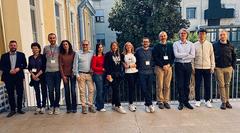URL: https://www.desy.de/news/news_search/index_eng.html
Breadcrumb Navigation
DESY News: New EU project iSenseDNA focuses advanced biotechnology
News
News from the DESY research centre
New EU project iSenseDNA focuses advanced biotechnology
Understanding how a specific molecule behaves during complex biological processes is a challenge facing biomedical research, despite major biotechnological progress made in recent years. A major new EU project, iSenseDNA, is now focusing on developing a technology to identify what a change in the structure of a molecule could entail for its function. The new EIC pathfinder project, coordinated by Uppsala University, joins researchers from 8 universities, research centres and companies from six countries.

Of vital importance for the project will be the fast non-invasive optical readout of biomolecular samples. At DESY, researchers explore how this can be achieved leveraging photonic ultrafast light sources. “Such light sources can in principle be integrated on photonic chips and may lead to new compact and low-cost precision sensors”, says Tobias Herr who is leading the team at DESY.
In the project, the researchers will combine computational and biotechnological methods as tools for advanced optical analysis of biomolecules “in action”. Together they want to develop a so-called nano-transducer, a DNA-based sensor that is sensitive to structural changes and can read these in real-time.
“This multidisciplinary project establishes a collaboration between different fields and technologies that has the potential to extract otherwise well-hidden information about complex processes, which will eventually contribute to advances in medical diagnostics and treatment,” says Lynn Kamerlin (Uppsala University), one of the coordinators of the project.
The researchers within iSenseDNA come from universities (Uppsala, Umeå, and Padova universities), research centres (CNR, BIO, DESY, ESRF), and a company (OrganoTherapeutics, OT) across Europe (Sweden, Italy, Spain, Germany, Luxembourg, France). The project has a total budget of approximately three million euros and is financed by the European Innovation Council within the framework of the EIC pathfinder Open Call.
More information
EIC pathfinder website



